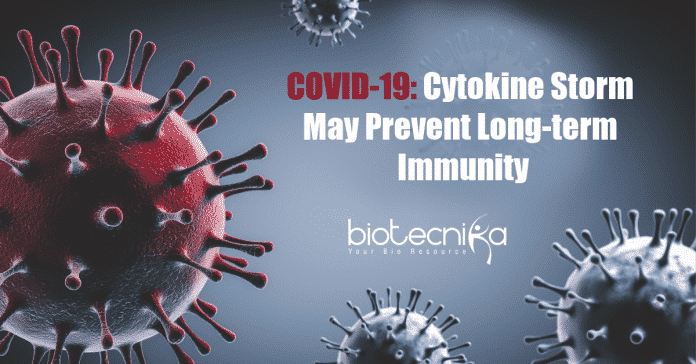COVID-19: Cytokine storm may prevent long-term immunity
When an individual’s body releases too many pro-inflammatory cytokines, It causes cytokine storm – an inflammatory condition associated with COVID-19 infection.
It can trigger organ damages as well as raise the risk of death if left untreated.
A group of researchers led by Dr. Shiv Pillai, an investigator at Ragon Institute of Massachusetts General Hospital, MIT, and Harvard as well as a professor at the Harvard Medical School, stated that cytokine storms might be the reason why patients with COVID-19 are unable to develop long-lasting immunity against COVID-19.
The outcome of the study is released in the journal Cell. The study suggests that this is because of the lack of germinal centers in the spleen and lymph nodes of COVID-19 patients. Germinal centers specific areas in spleen and lymph nodes where B cells (the cells that release antibodies) develop into memory cells, which develop log lasting immunity against pathogens.
Lymphoid organs, germinal centers, and B and T cells
A network of specialized tissues and organs that produce and develop specific B, as well as T cells, is present in the human immune system. B and T cells are produced by bone marrow and
thymus, thus called primary lymphoid organs. As spleen, lymph nodes, as well as Peyer’s patches, expose these cells to antigens, they are called secondary lymphoid organs.B and T cells are lymphocytes that aid in combating infections. B and T cells are a part of the acquired immunity: the immunity which we develop after exposure to antigens rather than the innate immunity, which is present in the body from the time of birth.
When a pathogen enters into the body, the germinal centers develop in secondary lymphoid organs, and antigen-specific B cells are chosen and multiply inside these areas. There are two types of B cells: plasma cells and memory B cells.
The first one releases antibodies, and the second one generally works with remembering an antigen so that quick immune action is produced the next time the same antigen is encountered. T cells, specifically the T follicular helper cells, aid in the production of antibody diversity and in stimulating B cell proliferation within germinal centers.
Effect on germinal centers in COVID-19 patients
In the current study, scientists looked into the spleens and lymph nodes of people who died of coronavirus infection. A few of these people had died within ten days of hospitalization, while others had died within 15 to 36 days of hospitalization. The absence of germinal centers was the one thing common in all these people.
A significant reduction in B cells was also shown by these patients. There will not be a high-quality immune reaction to produce log lasing antibodies without B cells.
Surprisingly, T follicular helper cells were lessened in these patients, which Dr. Pillai suggested as the possible factor for the decrease in B cells.
The relation between cytokine storm and COVID-19 infection
Previous studies in animal models have formerly revealed that cytokines, especially TNF, can inhibit the development of T follicular helper cells.
Large amounts of TNF were observed in the germinal centers of severe COVID-19 patients. T follicular cells are likewise differentiated (become specific to an antigen) inside the lymphoid organs before they go on to stimulate B cells.
While describing the research, Dr. Pillai stated that without the development of germinal centers, there is not likely to be long-lasting memory to this virus developing from all-natural infections, implying that while antibodies might protect people for a relatively short time, a single person who recovers from the disease can get infected again, perhaps 6 months later, or even multiple times. This implies that developing herd immunity against COVID-19 may be hard.
Author: Sruthi S






























